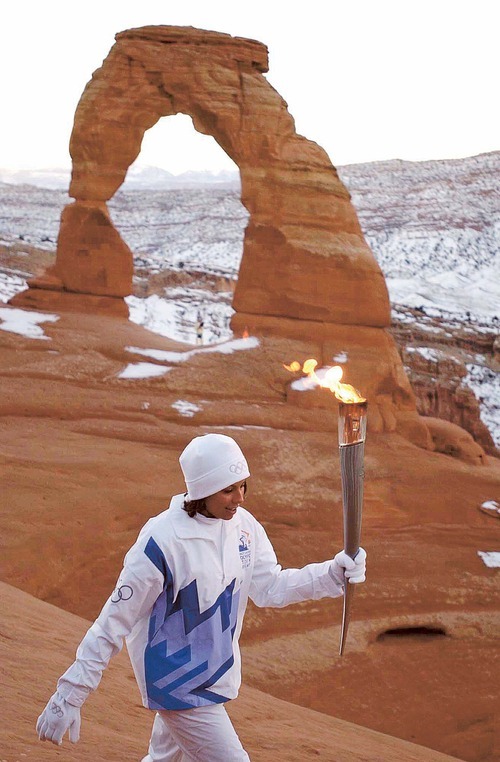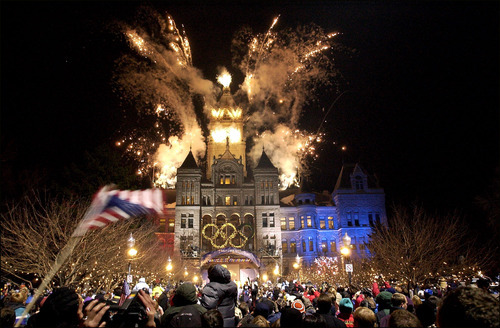This is an archived article that was published on sltrib.com in 2012, and information in the article may be outdated. It is provided only for personal research purposes and may not be reprinted.
Salt Lake City should bid for the 2026 Winter Olympics and Paralympics.
The Utah Olympic Exploratory Committee made that recommendation Thursday to Gov. Gary Herbert and Salt Lake City Mayor Ralph Becker, contending the state is "ready, willing and able" to stage the Games again.
"Utah's Olympic legacy is strong and vibrant and ready to provide the foundation for a future Olympic Winter Games," said the committee's report, released by the governor's office. It urged Herbert and Becker to position the city and state to go for the Winter Games the next time the U.S. Olympic Committee puts forth an American candidate.
"Bringing the Games back to Salt Lake City," the report said, "would provide additional opportunities to give back to the Olympic movement, continue to promote Olympic ideals, strengthen and grow our sustainable legacies from the 2002 Games and further support sport and physical activity as key elements of city and state public health initiatives."
And, the report said, it would benefit the economy to the tune of $5 billion in direct and indirect output, 30,000 job years of employment and $75 million in state and local-government tax revenues.
As report recipients, Herbert and Becker declined comment Thursday on its contents. They are expected to decide by mid-November how to act upon the recommendation.
The governor and mayor assembled the committee in February — as the state reveled in 10th-anniversary celebrations of the 2002 Winter Games — to explore the possibility of again staging the Olympics and Paralympics.
Thoughts of doing so as early as 2022 were dashed when the USOC decided to bypass that bid cycle while figuring out what Games an American city would have the best chance of winning. The USOC could opt to go for the 2024 Summer Olympics, the 2026 Winter Games or both, depending on a bid strategy currently being developed.
But with the resolution this year of a contentious fight between the USOC and the International Olympic Committee about revenue distribution, the American Olympic movement has more confidence than it's had in years that the Games will come back to U.S. soil before too long.
Salt Lake City is eager to again welcome the world, the Olympic Exploratory Committee said, citing the presence of world-class venues that are still in use, venue communities with more hotel rooms and improved transportation systems, strong sports programs for elite as well as recreational athletes, and community pride in being an Olympic city.
"People saw what the Olympics did for the community — and it was a wonderful experience," said Lt. Gov. Greg Bell, committee co-chairman along with Becker and Steve Price, chairman of the Utah Sports Commission, a quasi-state agency that attracts national and international sports events to Utah.
"I have to tell you I expected somebody to raise an objection [to bidding again]," Bell added, "but we have had across-the-board support and enthusiasm. That's because of our core strength in having put on the Games and having kept our venues open and up-to-date."
Keeping them in competitive shape between now and 2026 could be a challenge, the report acknowledged, urging the state to "support" the Sports Commission in its enticement mission and the Utah Olympic Legacy Foundation in its goal of keeping operational the Utah Olympic Oval in Kearns and Utah Olympic Park outside of Park City.
Bell said it would be going too far to construe "support" to mean public financial assistance for the Olympic Legacy Foundation, which received a $76 million endowment from the 2002 Winter Games. While the endowment has done reasonably well financially during the past decade, it has shrunk in tumultuous times and could stand to be replenished.
Fraser Bullock, the No. 2 executive in the 2002 Salt Lake Organizing Committee and an adviser in this process, said some "state funding is an alternative that should be explored within an overall strategic plan."
He noted that Utah received a great return on the 1989 investment of $59 million that voters approved to build Olympics-related facilities without a guarantee the Games would come here. "We should consider doing some of that again," Bullock added.
In fact, the $1.67 billion budget projected for a 2026 Olympics and Paralympics includes $75 million for a new endowment to support the Oval and Olympic Park after 2026, plus $85 million that would be repaid to the state for investments beforehand.
Those investments could help Utah Olympic Park secure its position as a training center for jumping and sliding athletes from around the world. To do so, the report said, the park needs to add athlete housing, an athlete-services building with a sports-medicine emphasis, and meeting rooms.
"Salt Lake City and the state are well positioned," it added, "to offer the USOC and the IOC a strong compact Games concept with low financial and delivery risk, and minimal environmental impacts, while providing very high quality Games."
To Price of the Utah Sports Commission, none of Salt Lake City's competitors for a Winter Games — Denver, Reno-Tahoe and Billings, Mont. — can come close to matching what Utah has to offer.
"The Olympics were good for Utah in the past," he added, "and an Olympics will be good for Utah in the future."
Twitter: @sltribmikeg —
Utah and the Olympics by the numbers
$59 million • Public investment approved by voters in 1989 to build original Olympics-related sports facilities.
$75 million • Endowment from 2002 Winter Games' profits left to run those facilities afterward.
$4.8 billion • Estimated economic output of the 2002 Games, along with 35,000 job years of employment, government tax revenues of $76 million
$5 billion • Projected economic output of the 2026 Games, along with 30,000 job years of employment and government tax revenues of $75 million.
2016 • The year bidding begins to become the U.S. Olympic Committee's nominee for 2026.
2019 • The year the International Olympic Committee will award the 2026 Games.
$25 million-$30 million • Projected cost of a privately funded bid for the 2026 Games; $4.7 million-$5.7 million to win the U.S. nomination, $20 million-$24 million for the IOC bid.
$1.67 billion • Estimated budget of a 2026 Olympic organizing committee
Source: Utah Olympic Exploratory Committee





